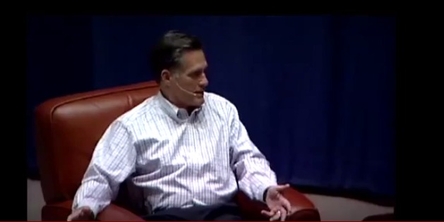Mitt Romney's political fortunes got a bit of a boost over the weekend when he won the straw poll at the Southern Republican Leadership Council meeting in New Orleans. Romney won the straw ballot by a single vote over Ron Paul. Sarah Palin finished a distant third despite giving a barnburner of a speech. Meanwhile, Romney was absent from the proceedings altogether.

But the former Massachusetts governor is a long way from grasping the brass ring of the GOP nomination. At this point all Romney has grasped is, well, straw. Ben Smith and Jonathan Martin of Politico.com note that Romney's strong showing in New Orleans was due in no small part to a group called Evangelicals for Mitt. They offered 200 free tickets to the gathering to Republicans who made a commitment to vote for Romney in the straw poll. The American Spectator further notes that Romney supporters also received free buttons, bumper stickers and copies of his book No Apology – The Case for American Greatness. Well, at least they weren't saddled with any lousy T-shirts.
Yet one must refrain from reading too much into this straw poll. In August 2007, Romney handily won the Iowa straw poll. Well, fat lot of good that did him against Mike Huckabee in the Iowa Caucus the following January.
Last week, I attended a talk given by Romney at the Boston Public Library sponsored by the Ford Hall Forum, the oldest free public lecture series in the United States. Romney was interviewed by Boston Globe columnist Jeff Jacoby. As the Globe's lone conservative columnist it came as no surprise that Jacoby was generally friendly in his questioning of Romney.
However, Jacoby would become more adversarial in his approach to when it came to the subject of health care. Jacoby challenged Romney's assertion that health care was "much better in Massachusetts" due his implementation of Mass-Care or Romneycare. It is, of course, the program Romney signed into law in 2006 that requires all Massachusetts residents to have health insurance or be fined by the Department of Revenue. Sound familiar?
Jacoby focused his attention not on the mandatory aspect of the program but rather the fact that health care premiums are higher in Massachusetts than in any other state and are also growing faster than in any other state. Romney became defensive and stated, "Health care premiums were higher before the law passed." But in No Apology, Romney touts the Massachusetts Model as creating an exchange that assists individuals in buying health insurance. He writes on page 177, "The exchange lowers premiums and enables individuals to buy health insurance in pretax dollars, just as companies are able to do."
However, Romney took no responsibility for higher premiums and was content to blame Governor Deval Patrick, the legislature, and "the connector board" (the Commonwealth Health Insurance Connector Authority, which is the "exchange" responsible for helping Massachusetts residents find health insurance) for extending coverage to include mental health, dental care, and in vitro fertilization.
It is worth remembering that Romney signed the plan into law the same year in which he opted not to seek re-election. Now Governor Patrick, the state legislature, and "the connector board" have a lot for which to answer. But is Romney telling us he could not have foreseen that a Democratic governor, a Democratic controlled legislature, and a board full of Democratic appointees would have extended Romneycare coverage once he left office?
The best Romney could do was to half-apologize for his own creation by claiming "it isn't a perfect plan." The audience, which had mostly been receptive to Romney on other matters such as foreign affairs and economic policy, sat on its hands.
Conservative audiences might end up with their fingers falling asleep if Romneycare continues to get praise from the likes of President Obama and New York Times columnist Gail Collins. Naturally enough, potential rival GOP contenders are already making an issue of Romneycare. Last month, Minnesota Governor Tim Pawlenty said in an interview, "Looking at the Massachusetts experience, it would not be one I would want for the country to follow any further." In an interview of his own, former Arkansas Governor Mike Huckabee, Romney's arch nemesis in Iowa, called Romneycare "a dismal failure."

If Pawlenty and Huckabee are gunning for Romney now, one can only imagine what things will be like right before the GOP caucuses and primaries. Not surprisingly, Romney's advisers are counting on health care fading into the background. If a week in politics is a lifetime, then two years might as well be an eternity.
So it would be a mistake to write off Romney. John McCain's campaign was singing its swan song scarcely four months before the 2008 New Hampshire Primary. Many conservatives were angry at McCain for his support of amnesty for illegal immigrants (and, with the challenge from J.D. Hayworth, still are). But McCain sunk his teeth into another issue and one scarcely anyone else was willing to touch – the surge in Iraq. With the likes of Harry Reid and even some Republicans wondering aloud if the war was lost, McCain vigorously backed the surge and won back a critical mass of GOP primary voters. Despite Romney's proximity to the Granite State, he lost to McCain by six points.
Health care is to Romney in the spring of 2010 what illegal immigration was to McCain in the summer of 2007. If Romney can find an issue that resonates with Republican voters and conservative activists, he could find himself back in the saddle. The thought of a Romney-Obama debate on economic and international affairs is downright tantalizing. It could be Reagan-Carter all over again. But Romney first needs to find his grasp.

